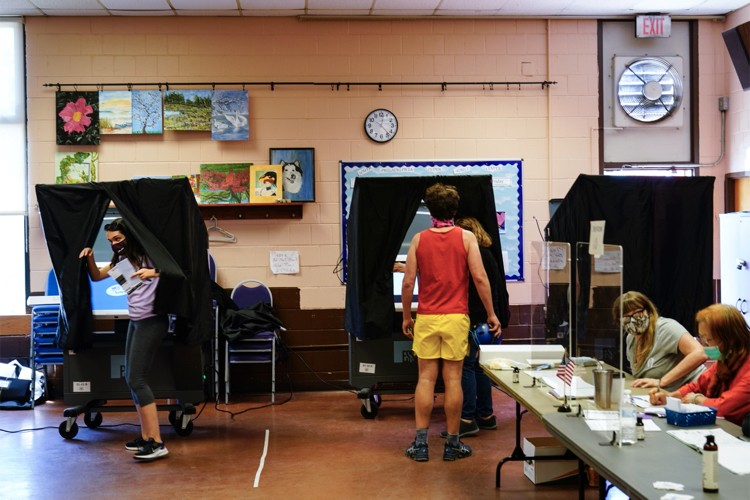by Veronika Kyrylenko
New American

AP Images
The Keystone State voters became the first in the nation to curb their governor’s emergency powers, approving constitutional amendments proposed by Republican lawmakers angry over Democratic Governor Tom Wolf’s harsh COVID-19 restrictions.
On May 18, Pennsylvania held a municipal primary, when registered voters across the state cast ballots for their party’s favored candidates to run in November’s general election. Voters picked their party nominee for district attorney, city controller, and a slew of judicial seats. There were also plenty of local races to decide in Philly’s collar counties. Additionally, Pennsylvanians found four ballot questions, two of which proposed changes to the governor’s disaster declaration powers:
Question 1
Shall the Pennsylvania Constitution be amended to change existing law and increase the power of the General Assembly to unilaterally terminate or extend a disaster emergency declaration … through passing a concurrent resolution by simple majority, thereby removing the existing check and balance of presenting a resolution to the Governor for approval or disapproval?
Question 2
Shall the Pennsylvania Constitution be amended to change existing law so that: a disaster emergency declaration will expire automatically after 21 days, regardless of the severity of the emergency, unless the General Assembly takes action to extend the disaster emergency; the Governor may not declare a new disaster emergency to respond to the dangers facing the Commonwealth unless the General Assembly passes a concurrent resolution; the General Assembly enacts new laws for disaster management?
Pennsylvania voters answered “Yes” to both of the questions, stripping Governor Wolf off of his extraordinary emergency powers. The first approved amendment essentially provides the legislature the ability to end emergency declarations by majority vote, while the second requires the governor to return to the legislature to seek renewal of emergency orders at the 21-day mark.
For more than 13 months, Wolf largely acted single-handedly in issuing socioeconomic restrictions under his emergency powers, as well as via the state’s 1955 Disease Prevention and Control Act, which irked the legislature and many Pennsylvania business owners affected by the lockdowns and the at-times abrupt nature of ever-expanding additional restrictions.
Republicans see the referendum as a victory with strong political overtones, as the state gears up for a wide-open governor’s race in 2022 and Wolf leaving office after two terms.
Republicans in the state legislature and those aiming to replace him in 2023 have made Wolf a top political target, repeatedly attacking his stewardship during the pandemic, including his orders shuttering businesses, sending students home for online schooling, and requiring that masks be worn outdoors.
“Last night, Pennsylvanians voted to reject Democrat Gov. Tom Wolf’s overreach of executive powers after his failed COVID response — a clear sign of accountability coming in 2022,” Republican National Committee chair Ronna McDaniel tweeted Wednesday.
The state’s Republican Party chairman, Lawrence Tabas, said in a statement that Pennsylvanians voted to “put a stop to Gov. Tom Wolf’s dictatorship.”
Charles Mitchell, who heads the free-market Commonwealth Foundation in Harrisburg, called it a “momentous day in the history of Pennsylvania and the United States.”
“It is prudent to allow executives to act quickly and decisively in case of an emergency,” Mitchell said. “However, the principles of representative self-government dictate that such decisive action cannot be maintained in perpetuity, without any valid check on executive power.”
Wolf has largely lifted his restrictive orders, with the remaining limitations on crowd capacity lifting after May 30 and a mask-wearing mandate for the unvaccinated that tracks federal guidance, until 70 percent of adults are vaccinated.
Lawmakers in at least 40 states and two territories have introduced more than 200 bills or resolutions this year that would limit or impose greater oversight on governors’ powers or spending decisions during an emergency, according to the National Conference of State Legislatures (NCSL).
NCSL specifies that “In times of war, disease or other extraordinary conditions, each state authorizes its governor to declare a state of emergency. Once an emergency has been declared, executive powers expand until the emergency ends. These powers include authority normally reserved for legislatures, such as the ability to suspend existing statutes or effectively create new laws — albeit temporarily and only as needed to respond to the emergency situation.”
As the United States experiences plummeting rate of COVID-19, the “emergency” is evidently over. With Pennsylvania showing an example of shifting power back to legislative branch, many other states are expected to follow suit.
The constitutional amendments in Pennsylvania will take effect fully after the primary election is certified by the Acting Secretary of the Commonwealth, who is expected to do so by June 7.
Meanwhile, on Thursday, Governor Wolf signed a renewal of the proclamation of disaster emergency for the COVID-19 pandemic in Pennsylvania, saying “we need just a little more time under this current disaster declaration to ensure that we do not risk valuable resources that will help Pennsylvania recover from the pandemic.” Wolf didn’t specify how much time Pennsylvania will need to recover after his “pandemic-related” restrictions.
